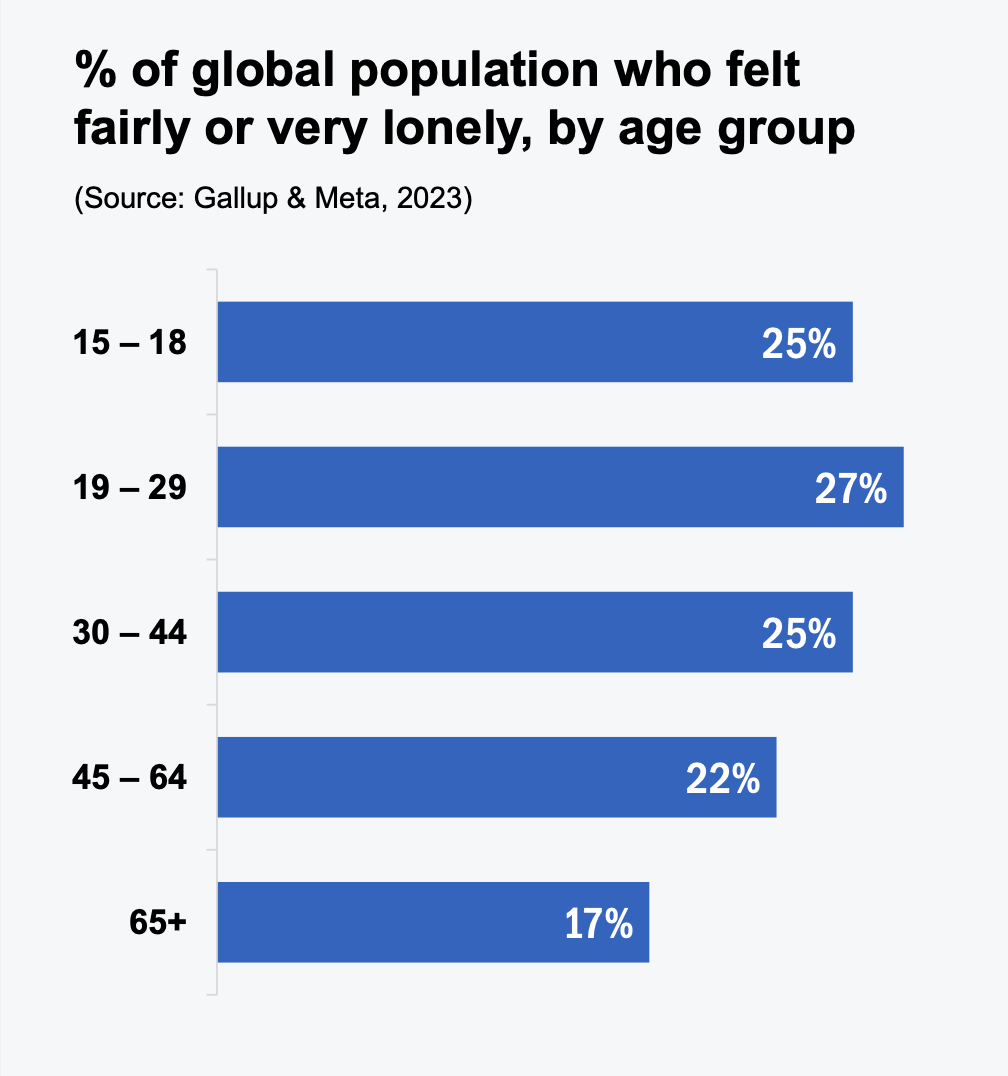Feeling lonely in Singapore in your 20s and 30s?
Chances are, you're not alone in feeling this way, according to the results of a 2023 poll done by the Institute of Policy Studies (IPS).
The poll found that younger Singaporeans aged 21 to 34 were more likely to feel socially isolated & lonely, especially if they were single.
The poll was conducted by IPS between November and December 2023, ahead of the Singapore Perspectives conference on Jan. 22 and 29, 2024.
2,356 Singapore Citizens and Permanent Residents aged 21 to 64 participated in the online poll.
Those aged 21 to 34 most likely to report loneliness, social isolation
Loneliness has been recognised as an issue faced by seniors.
However, the poll findings showed that young people are also prone to feeling lonely and isolated in Singapore.
Those aged 21 to 34 reported the highest loneliness score based on a three-item loneliness scale, compared to the other groups.
 Younger Singaporeans reported higher levels of social isolation, according to a 2023 IPS poll. Image from IPS.
Younger Singaporeans reported higher levels of social isolation, according to a 2023 IPS poll. Image from IPS.
Respondents in this age group were more likely to feel isolated, left out, and lacking companionship.
Single respondents in the 21 to 34 age group were more likely to report feelings of loneliness, compared to peers who are dating.
In the 35 to 49 age band, those who were unmarried were more likely to experience feelings of loneliness compared to their married counterparts.
Social anxiety was also an issue.
53 per cent of respondents aged 21 to 34 said they found it easier to talk to people online, with 56 per cent of them saying they sometimes feel anxious if they have to talk to people in person, compared to 43 per cent of those aged 35 to 49 and 32 per cent of those aged 50 to 64.
Limitations of the online poll
Commenting on the poll's findings, IPS Research Fellow Wong Chin Yi added the caveat that "it cannot be concluded that youths are the loneliest age group based on the poll."
This was because the online poll was restricted to respondents between the age of 21 and 64.
On that point, Wong noted that social isolation is a major concern for the elderly as well.
Additionally, it can be normal or even expected to have feelings of loneliness sometimes, Wong said.
"[But] when we compare by age, these differences are quite consistent across the three items, with younger respondents be more likely to report higher levels of social isolation," he concluded.
Issues not unique to S'pore
Wong pointed out that surveys done outside of Singapore had turned up similar results.
For example, a 2023 Gallup & Meta study conducted across 142 countries found that more young people aged 19-29 reported feeling lonely than any other age groups.
 Statistics from 2023 Gallup & Meta study on loneliness. Image from IPS.
Statistics from 2023 Gallup & Meta study on loneliness. Image from IPS.
Wong also referenced other studies and news reports about how social distancing measures in the wake of Covid-19 disrupted interactions with friends and family, and raised concerns of an “epidemic of loneliness”.
He noted that loneliness is typically characterised as an elderly issue, but that recent research increasingly demonstrates that the young are not immune to it either.
Changing perceptions of marriage and parenthood
Another hot topic explored in the poll was that of family.
82 per cent of respondents aged 21 to 34 said that it is acceptable for people to choose singlehood.
That said, 70 per cent of unmarried respondents in this age group still foresaw marriage in their future.
IPS Senior Research Fellow Kalpana Vignehsa said this was due to attitudinal shifts, where fewer and fewer youth respondents find romantic relationships and parenting to be essential for self fulfilment.
But while perceptions of marriage and parenthood have shifted, actual family aspirations and plans haven't changed as much.
IPS Adjunct Senior Research Fellow Chew Han Ei commented that today's younger people have "checkboxes" to fulfil before setting their eyes on marriage.
These "checkboxes", which Chew described as being "nearly all material in nature", include securing a good job, a home, and a comfortable life.
In contrast, for previous generations, the priorities of getting married and getting a job were more "equally weighted" without a strict order, Chew said.
Other findings on work and civic engagement
IPS's poll also set out to address other areas of concerns in the lives of young Singaporeans, such as their work and civic engagement.
Results revealed that younger respondents are more worried about their work prospects, and find it difficult to attain their preferred form of employment in Singapore.
But not all is bleak for our youths.
More open to and prepared for the future of work, their generation displays a readiness to adapt to changing working landscapes, such as being willing to explore different career paths and tackle technological advances.
Younger respondents are also more civically engaged, both online and offline, as compared to their older counterparts.
Top image from Unsplash.

If you like what you read, follow us on Facebook, Instagram, Twitter and Telegram to get the latest updates.



